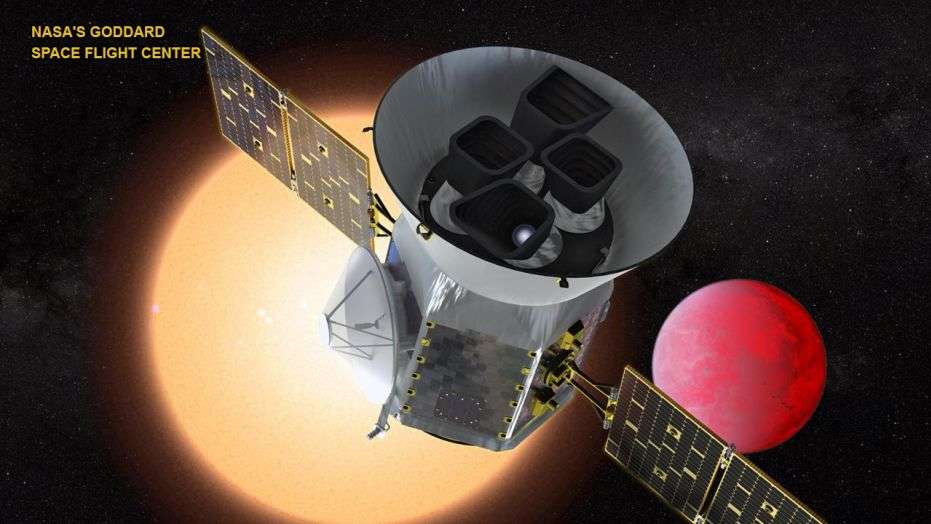NASA is heightening the search for alien life using ‘technosignatures’

According to a new study, NASA’s new Transiting Exoplanet Survey Satellite has detected its first alien world, a ‘super-Earth’ that is likely evaporating under the heat from its star.
If E.T. is out there, NASA thinks it has a new way to find him – tracking the time he spends on his iPhone.
NASA is upping the search for whether we are alone in the universe, using new tools in an effort to find “technosignatures” that may emanate from advanced civilizations.
The government space agency is hosting a workshop in Houston to utilize “technosignatures,” signs or signals it says could be evidence of a technologically advanced civilization.
MASSIVE GLOWING ‘ROGUE’ PLANET SPOTTED ‘DRIFTING’ IN SPACE
“Technosignatures are signs or signals, which if observed, would allow us to infer the existence of technological life elsewhere in the universe,” NASA said on its website. “The best known technosignature are radio signals, but there are many others that have not been explored fully.”
Under the scope of looking for extraterrestrials, “technosignatures” have generally been limited to communication signals, but any kind of evidence, such as “radio or laser emissions, signs of massive structures or an atmosphere full of pollutants could imply intelligence,” NASA added.
NASA has several tools that it uses to look for exoplanets, including its $337 million alien-planet hunting Transiting Exoplanet Survey Satellite, known as TESS.
NASA SOLVES MYSTERY OF CIGAR-SHAPED UFO, BELIEVED TO CARRY ALIEN LIFE
Earlier this month, NASA released the first images from TESS. Included in the first batch of pictures are the Large Magellanic Cloud and the bright star R Doradus, among several other planets and stars that could potentially be home to alien life.
Fast radio bursts (FRBs) have recently been discovered emanating from deep space, though there is no explanation for what causes them.
Most recently, unusual and “mysterious radio bursts” were detected 3 billion light years away from Earth, thanks to an artificial intelligence program at the Search for Extraterrestrial Intelligence (SETI).
“Complex life may evolve into cognitive systems that can employ technology in ways that may be observable,” NASA wrote in its 2015 Astrobiology Strategy paper. “Nobody knows the probability, but we know that it is not zero.”
WE NEED TO KEEP LOOKING FOR ALIENS, SCIENTISTS TELL SENATORS
However, it’s not clear whether we’ll ever find evidence of advanced civilizations, as put forth by the physicist Enrico Fermi with his Fermi paradox, which states “that if another intelligent life form was indeed out there, we would have met it by now.”
On the other hand, astronomer Frank Drake created a formula in 1961 known as the Drake equation which theorizes that there are approximately 10,000 potentially intelligent civilizations in the galaxy, so the topic is up for much debate in the scientific community.
For its part, NASA says it will keep looking for signs of alien life, even if they haven’t found anything yet.
“Although we have yet to find signs of extraterrestrial life, NASA is amplifying exploring the solar system and beyond to help humanity answer whether we are alone in the universe,” NASA said on its website.
Follow Chris Ciaccia on Twitter @Chris_Ciaccia



 Creators of mankind
Creators of mankind Description of “Tall white aliens”
Description of “Tall white aliens” Where they came from?
Where they came from? About hostile civilizations
About hostile civilizations The war for the Earth
The war for the Earth “Tall white aliens” about eternal life
“Tall white aliens” about eternal life Video: “Nordic aliens”
Video: “Nordic aliens” Aliens
Aliens Alien encounters
Alien encounters The aliens base
The aliens base UFO
UFO Technology UFO
Technology UFO Underground civilization
Underground civilization Ancient alien artifacts
Ancient alien artifacts Military and UFO
Military and UFO Mysteries and hypotheses
Mysteries and hypotheses Scientific facts
Scientific facts


















